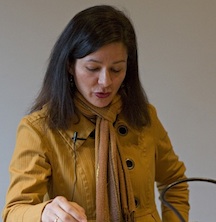By Erin Cotton
The Phi Beta Kappa Society in conjunction with the American Philosophical Association (APA) awarded the 2015 Lebowitz Prizes to Jennifer Lackey and Alvin Goldman for Philosophical Achievement and Contribution for their symposium “Social Epistemology.” The symposium will be presented twice; the first time at the APA Eastern Division Meeting early next January in Washington, DC. The second presentation will be hosted by the Phi Beta Kappa Society at a yet to be determined location.
Ordinarily, each year the symposium program features two lectures on an important or current philosophical issue chosen to provide contrasting views. The winners were selected through a nomination process and then by a committee appointed jointly by the Phi Beta Kappa Society and the American Philosophical Association. The Lebowitz Prize provides a significant recognition for the work of these celebrated philosophers for their excellence in thought and historic contributions to the process of inquiry, in addition to awarding an honorarium of $29,000 to each recipient.

JENNIFER LACKEY, professor of philosophy at Northwestern University, specializes in epistemology and the philosophy of the mind. She is the author of Learning from Words: Testimony as a Source of Knowledge, in which her thesis works to reshape our understanding of the reliance we place on the words of those around us. Her forthcoming article, “What Luck is Not,” can be previewed on the Northwestern University website alongside a list of her numerous completed articles. Among her awards and accomplishments, Lackey was most recently awarded the Kaplan Institute for the Humanities Fellowship.

ALVIN GOLDMAN, professor of philosophy at Rutgers University, is the author of A Theory of Human Action, Knowledge in a Social World, Epistemology, A Contemporary Introduction and over ten others from the past thirty years. His work consistently challenges and reformulates the conversation surrounding epistemology, especially within the discussions of social, cultural and technological changes and their effects on human interaction. Goldman was also awarded the Romanell Prize Lecturer award on Philosophical Naturalism by the American Philosophical Association in 2010.
Epistemology is the theory of knowledge and a close analysis of what distinguishes supported belief from opinion. The topic of the Lebowitz Prize symposium is social epistemology, distinguished as the study of knowledge and its relation to the social world. Human knowledge as can be understood as a socially constructed collective achievement.
“When should you defer to that person’s opinion and abandon your own? How can we make intelligent choices here without ourselves becoming experts? Can social institutions do a better job at guiding the public through this thicket of issues?” asks Goodman. “These are practical problems; but they are also difficult theoretical problems, which comprise parts of the mission of social epistemology.”
The Lebowitz Prize opens up a dialog between distinguished scholars. “According to traditional epistemology, we are like Robinson Crusoe when it comes to intellectual matters; we must each figure out for ourselves what to believe by our own devices,” states Goodman. “But don’t we also have multiple opportunities to listen to other people’s opinions and experiences, whether in person or on the Internet? . . . This is one of the central problems of social epistemology, which we confront as individuals and as a society.”
The upcoming symposium emphasizes the importance for discussion to evolve and become inclusive rather than to end on a final “correct” answer in philosophy. While Goodman focuses on the social dimensions of individual cognition, Lackey discusses the epistemic properties of collective entities. Both approaches contrast, through a more collaborative than competitive process. “On my view, groups are epistemic agents that have evidential and normative constraints that arise only at the collective level, through group epistemic states are still largely a matter of the states of individual members. The result is a view that neither inflates nor deflates collective epistemology,” says Lackey.
For those interested in contemplating social epistemology, Goodman and Lackey’s presentations and conversations at the symposium this January will be a rich and engaging experience.
Erin Cotton is a junior at Wheaton College majoring in anthropology and creative writing. Wheaton College is the home of the Kappa of Massachusetts Chapter of Phi Beta Kappa.




